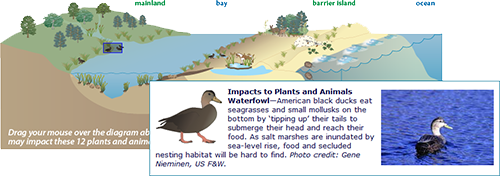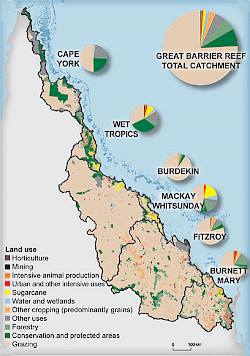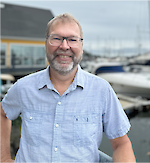Climate Change and the Holidays
Heath Kelsey ·Holidays are when we really catch up with family, and the "How's work?" question is inevitable. If you're lucky, a few family members are even interested in your reply, but we all know that's rare. I'm excited about what we do at IAN, but most of the time only a few of my family really want to get into it. This year though, I had the good fortune to be allowed on my soapbox a couple of times, and this may be a stretch, but I'm wondering if this reflects an evolution in attitude about climate change (more likely it's a vague notion that my job has recently changed, but I'll take it where I can get it).
Call it a changing social consciousness or just dumb luck to have a few interested folks at hand, but I got a lot of questions about climate change this year. Looking back on this year's events, we've gotten more involved with this issue at IAN, and I think it illustrates the way climate change is entering the larger discourse. The biggest scale debate is still about greenhouse gasses of course, but to most folks that seems, understandably, an intractable global issue that they have no control over.
Real work is happening at the local level though, and that's where we've been involved. There are a few projects we've been involved with that have direct and indirect implications from climate change. Our work with the National Park Service at Assateague Island, and with the Queensland Government in Australia on the Great Barrier Reef Report Card, are two good examples of how local decision making is forcing climate change issues to the forefront.
The most direct climate change implications is with our work with at the Assateague Island National Seashore, where we've been working with the National Park Service on a web-based educational module. The module illustrates the potential effects of climate change on habitats and resources on the island. It's not quite completed yet, but it's been a fascinating project, and really brings to life the real-world, local implications of rising sea levels, increased temperatures, and increased storm intensity and frequency that are the projected effects of global climate change on the US mid-Atlantic. The specific impacts vary by habitat and other factors, but will likely change the way the island looks and is experienced by it's visitors.

The really important part of this is that the park has addressed climate change impacts in its General Management Plan. Some of the alternatives in the plan may change the way visitors access the park in the future, which has generated some strong opposition within some parts of the local community. Despite the opposition, there is a silver lining. We, as a community, are being confronted head on by the implications of climate change through local decision making.

The Great Barrier Reef Example reflects a similar attitude towards climate change issues. Faced with limited control over the global greenhouse gas situation, in the Reef Protection Plan, the Queensland Government went after the things that it had more control over: pollutants entering the reef lagoon. Reducing pollutant loads hopefully will increase the resilience of the reef to the inevitable effects of climate change.
So, as the global deal-making goes on and on, with frustratingly slow progress on greenhouse gas reduction, there are real, tangible things happening at the local level that are forcing all of us to directly confront climate change. This can only be a good thing – if our local resources are being visibly affected by a changing climate, there just may be hope for efforts to reduce it's larger causes.
About the author
Heath Kelsey

Heath Kelsey has been with IAN since 2009, as a Science Integrator, Program Manager, and as Director since 2019. His work focuses on helping communities become more engaged in socio-environmental decision making. He has over 10-years of experience in stakeholder engagement, environmental and public health assessment, indicator development, and science communication. He has led numerous ecosystem health and socio-environmental health report card projects globally, in Australia, India, the South Pacific, Africa, and throughout the US. Dr. Kelsey received his MSPH (2000) and PhD (2006) from The University of South Carolina Arnold School of Public Health. He is a graduate of St Mary’s College of Maryland (1988). He was also a Peace Corps Volunteer in Papua New Guinea from 1995-1998.

